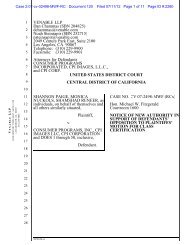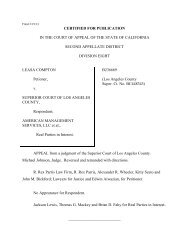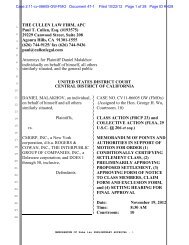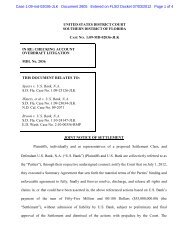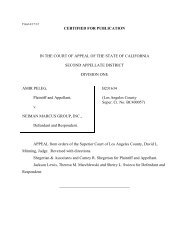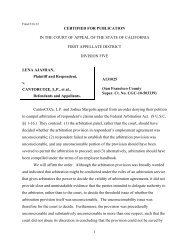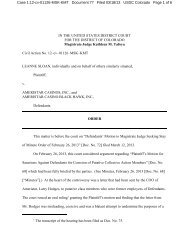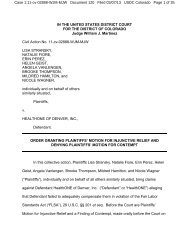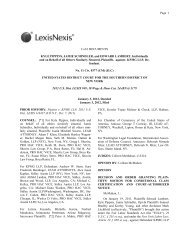order denying motion to decertify - Impact Litigation Journal
order denying motion to decertify - Impact Litigation Journal
order denying motion to decertify - Impact Litigation Journal
You also want an ePaper? Increase the reach of your titles
YUMPU automatically turns print PDFs into web optimized ePapers that Google loves.
Case 3:05-cv-01018-GPC-WVG Document 394 Filed 02/14/13 Page 4 of 9<br />
1<br />
2<br />
3<br />
4<br />
class, a court may consider “subsequent developments in the litigation.” Gen. Tel. Co. of S.W. v.<br />
Falcon, 457 U.S. 147, 160 (1982). “In considering the appropriateness of decertification, the standard<br />
of review is the same as a <strong>motion</strong> for class certification: whether the Rule 23 requirements are met.”<br />
Marlo v. United Parcel Serv., Inc., 251 F.R.D. 476, 479 (N.D.Cal.2008).<br />
5<br />
6<br />
7<br />
II.<br />
Analysis<br />
1. Dukes<br />
Rule 23(a)(3) requires a class-action plaintiff “<strong>to</strong> show that ‘there are questions of law or fact<br />
8<br />
9<br />
10<br />
11<br />
12<br />
13<br />
14<br />
15<br />
16<br />
17<br />
18<br />
19<br />
20<br />
21<br />
22<br />
23<br />
24<br />
25<br />
26<br />
27<br />
28<br />
common <strong>to</strong> the class.” The commonality inquiry does not require plaintiffs <strong>to</strong> demonstrate the<br />
“predominance” of common issues over individualized ones, nor the “cohesion” of the class. Negrete<br />
v. Allianz Life Ins. Co. of N. Am., 2012 WL 6737390, at *10 (C.D. Cal. 2012) (citing Dukes, 131 S.<br />
Ct. at 2556 (disclaiming any intent <strong>to</strong> overlap “Rule 23(a)(2)’s commonality requirement with Rule<br />
23(b)(3)’s inquiry in<strong>to</strong> whether common questions ‘predominate’ over individual ones”)). Rather,<br />
“even a single common question” will satisfy Rule 23(a)(2)’s commonality requirement. Dukes 131<br />
S. Ct. at 2556 (internal quotation & citation omitted).<br />
Here, the Court recognizes that an important issue in this litigation is whether class members<br />
relied on any of the alleged misrepresentations <strong>to</strong> their detriment. As set forth above, however, all that<br />
is required is a single common question for plaintiffs <strong>to</strong> satisfy their burden under Rule 23(a)(2). Thus,<br />
regardless of whether reliance may require individualized determinations (which the Court believes<br />
is not the case, as set forth below), at least one common issue question exists with regard <strong>to</strong> whether<br />
National Western’s sales materials included false representations. National Western does not dispute<br />
this.<br />
In essence, National Western’s argument regarding the necessity <strong>to</strong> undertake individualized<br />
inquiries <strong>to</strong> demonstrate reliance is really an argument regarding Rule 23(b)(3)’s predominance<br />
requirement. That is, National Western’s argument does not preclude a finding of at least one<br />
common question that can drive the outcome of this litigation. Accordingly, this Court concludes that<br />
Rule 23(a)(3)’s commonality requirement remains satisfied under Dukes.<br />
2. Reliance<br />
National Western argues, as a preliminary matter, that Plaintiffs must prove reliance on the<br />
4 3:05-cv-1018-GPC-WVG



